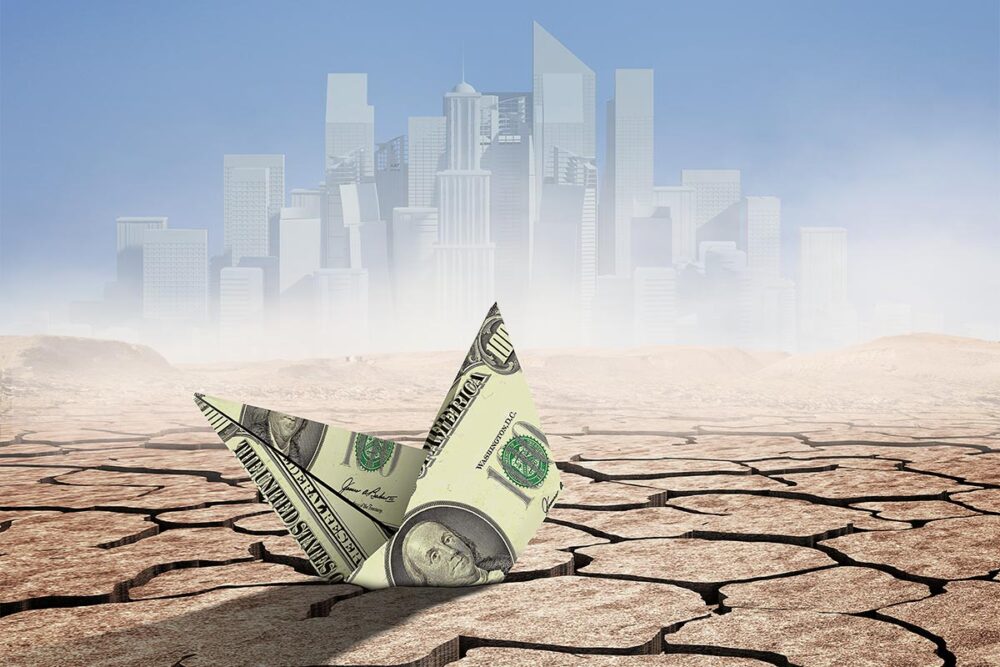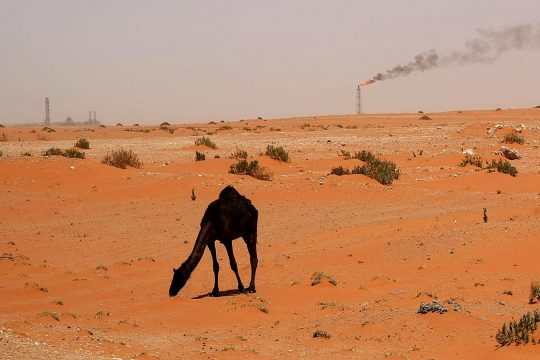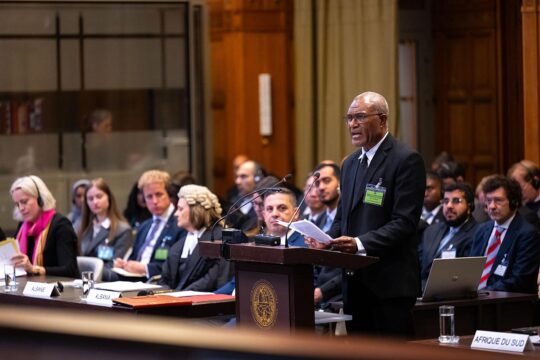COP28 is drawing to a close in Dubai (United Arab Emirates), marked by the paradox of its president, Sultan Ahmed Al Jaber, who is both CEO of the national oil company and founder of the Emirati renewable energy giant. "There is no science that says that the phase-out of fossil fuel is what’s going to achieve 1.5°C" [maximum increase in average global temperature set by the Paris Agreement at COP21 in 2015], he said on November 21 at an online conference organised by the NGO She Changes Climate.
However, the sixth report of the Intergovernmental Panel on Climate Change (IPCC), published in March 2023, is clear: a "gradual phase-out" of fossil fuels is needed if we are to stay below the target 1.5°C temperature rise. The experts add that this will require a reduction in global greenhouse gas emissions of at least 84% by 2050. In its report Net Zero by 2050, published two years ago, the International Energy Agency (IEA) was already calling for carbon neutrality to be achieved by mid-century, and for all investment in fossil fuel extraction to cease.
Any other trajectory would only exacerbate the humanitarian catastrophe linked to climate change, which in 2022 alone resulted in the forced displacement of 23.7 million people and the premature death of hundreds of thousands more: almost 62,000 in Europe alone as a result of the intense summer heatwave. And yet the time frame for phasing out fossil fuels has never seemed so far away: in 2023, the record for global greenhouse gas emissions is about to be broken, with a figure of 38.6 billion tonnes calculated by the 120 scientists of the Global Carbon Project.
Governments deemed responsible
Whose responsibility is it to halt this descent into hell? Politically, it lies with governments: under the international climate negotiation process, they are responsible for reducing global emissions in line with their historical responsibility for the accumulation of greenhouse gases in the atmosphere.
But "because climate negotiations were desperately slow, impacted communities along with climate NGOs began to sue states in courts, mostly wealthy states with high greenhouse gas emissions", explains Lucy Maxwell, co-director of the Climate Litigation Network run by Amsterdam-based NGO Urgenda. These NGOs read and use scientific publications.
In 2015, the first successful climate case brought by Urgenda against the Dutch government in The Hague was replete with IPCC data, validated one after the other by the Dutch government at successive COPs. The government was ordered to speed up the reduction of its emissions, on the grounds that it had not met its international commitments and that it must guarantee the fundamental rights of the Dutch people, in particular the right to life and the right to enjoy their property, which are threatened by climate change.
Inspired by the Dutch precedent, other successful actions against governments have followed: Friends of the Irish Environment against Ireland (judgment by the Irish Supreme Court in 2020), Notre Affaire à tous against the French government (judgment by the Paris Administrative Court in 2021), and recently Deutsche Umwelthilfe against Germany (judgment by the Berlin Administrative Court on November 30) and Klimaatzaak against the Belgian government (judgment by the Brussels Court of Appeal on November 30).
Fierce defence by oil companies
Meanwhile, the scientific literature is growing. The IPCC's reports are being relayed by other academic studies, including the famous Carbon Majors study in 2017. This points to the immense responsibility of fossil fuel producers in greenhouse gas emissions, particularly the oil giants in Saudi Arabia, the coal giants in China and the gas giants in Russia.
Alerted by these studies, and strengthened by their success against governments, European climate NGOs have filed climate lawsuits against the continent's major oil companies. So far, these have been less successful. Despite the victorious appeal by the Dutch NGO Milieudefensie, which in 2021 ordered the Anglo-Dutch company Shell to reduce its emissions 45% by 2030 compared with their 2019 level, these proceedings are dragging on.
"Fossil fuel companies invest a great deal in their legal defence," observes Justine Ripoll, head of campaigns at the association Notre affaire à tous, which filed a climate complaint against the French oil company TotalEnergies in January 2020. "Their strategy systematically consists of raising procedural points, which lengthens the time taken to investigate the case. What's more, the very existence of these companies is at stake in these appeals: they cannot suddenly reduce their fossil fuel production, which has until now been their raison d'être. That's why they are defending themselves so fiercely."
Banks in the firing line
And the chain of responsibility is increasingly well documented. Based on data provided by the IPCC, the IEA, IJ Global and Bloomberg, two leading agencies in the field of energy and financial information, an international consortium of NGOs has been publishing the annual Banking on Climate Chaos report since 2016. That report lists the financing received by the world's largest fossil fuel extraction companies and projects. This data, supplemented by the Carbon Bombs study, originally published in May 2022 by German geographer Kjell Kühne in the journal Energy Policy and enriched by financial analyses from French NGOs Data for Good and Eclaircies, was relayed at the end of October by an international consortium of media including Le Monde and The Guardian.
What does it tell us? That there are 422 major fossil fuel extraction sites in the world (coal, oil, gas), 294 of which are currently in operation and 128 of which are planned, each of which has a potential to emit more than a billion tonnes of carbon equivalent: these are the "carbon bombs". Together, they have an emission potential of more than 1,200 billion tonnes, compared with 500 billion tonnes, the maximum amount that humans can release according to the IPCC if we want to stay below the 1.5°C global temperature rise threshold. China, Russia, the United States and the countries of the Persian Gulf are the countries with the highest concentration of "carbon bombs".
The data collected reveals that between 2016 and 2022, the international financial sector invested USD 1,800 billion (equivalent to a year's worth of Russia's gross domestic product) in these “carbon bombs”, the exploitation of which is exacerbating the humanitarian catastrophe linked to climate change. The USD 160 billion granted to these projects in 2022 was mainly by Chinese, French, Japanese and US banks.
Climate NGOs have been quick to seize on this new information. In October 2022, Notre affaire à tous and two other French NGOs served formal notice on BNP Paribas to cease all financial support for new fossil fuel projects so that the Eurozone's second-largest bank comply with the objective of limiting global warming to 1.5°C. To do so, it leant on France's "duty of vigilance" law, passed in 2017, which requires companies with more than 5,000 employees to implement measures to prevent human rights and environmental abuses. In November 2022, Milieudefensie published a ranking of the seven Dutch financial institutions most involved in fossil fuel extraction projects, urging them to divest. The NGO has announced that legal action will be taken in January 2024. The case is being brought by Roger Cox, the lawyer who drafted Urgenda's case against the Netherlands and Milieudefensie's case against Shell.
What new horizons?
"These cases are crucial because there is still a lot of money in the pipeline for these fossil fuel projects, despite scientific evidence of the catastrophic humanitarian consequences of further dangerous climate change," says Lucy Maxwell. "We are trying to launch high-impact, strategic litigation," agrees Justine Ripoll. "Unlike TotalEnergies, BNP Paribas can more easily stop its involvement in the extraction of fossil fuels, without its entire business being called into question."
After the first generation of climate lawsuits against governments, the second generation against fossil fuel producers and the still nascent third generation against the banks that finance them, is there a new legal horizon? "It's clear that we're also looking elsewhere, for example at the agri-food sector, the companies responsible for deforestation, and intensive livestock farming with its methane emissions," continues Justine Ripoll. "But at this stage, the scientific data and information on these sectors lack transparency.”








